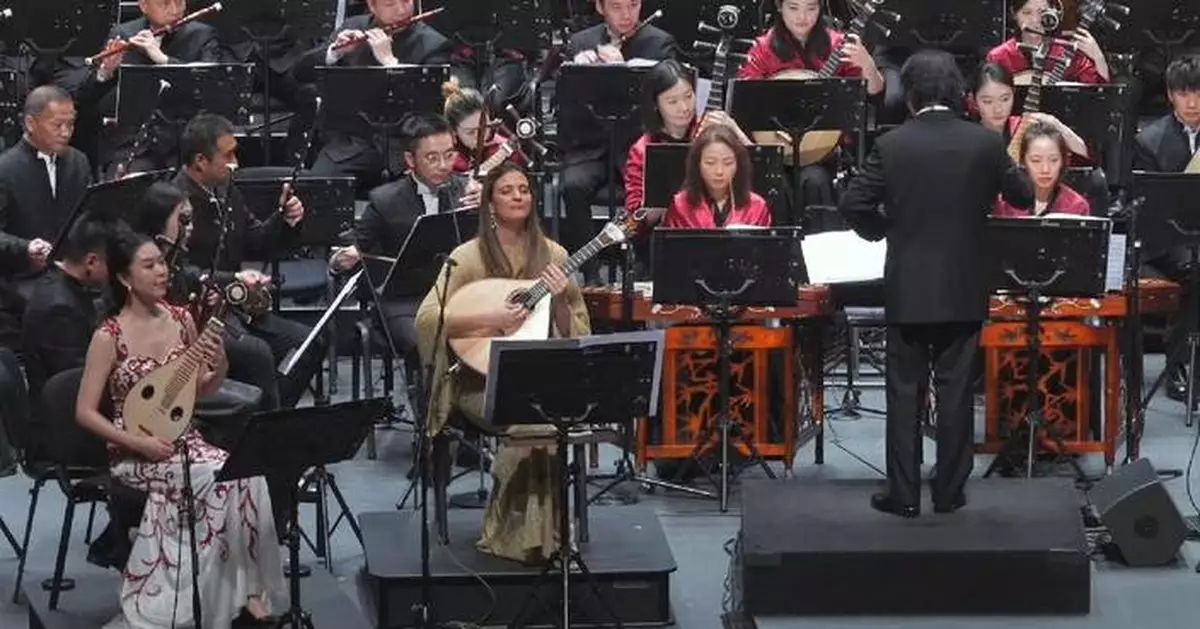With a legacy of over 30 years, the Macao Chinese Orchestra has captivated audiences with its unique performances by blending Chinese and Portuguese musical traditions, embodying the harmonious fusion of Eastern and Western cultures that define Macao's vibrant identity.
In early December, the orchestra staged a special concert at the Macao Cultural Centre to commemorate the 25th anniversary of Macao's return to the motherland.
The show opened with a lively rendition of "Havoc in Heaven," one of the most iconic scenes from the classic Chinese folktale Journey to the West. The piece was brought to life with the rhythmic beats of Beijing Opera gongs and drums.
Audiences were also treated to a stunning collaboration between the Liu Qin (Chinese string instrument) and Portuguese guitar Fado in the piece Macao Rhapsody, a musical dialogue that highlighted the city's fusion of Eastern and Western cultural elements.
The Liu Qin, dubbed as the "pearl of Chinese folk music," earned its name for its shape resembling the leaves of the willow tree ("Liu" in Chinese). Meanwhile, Fado, a traditional form of Portuguese music that translates to "fate" in Latin, tells the stories of Portugal's people with its soulful melodies.
The highlight of the evening was the premiere of Macao Rhapsody, a double concerto created by renowned Chinese composer Guan Naizhong. The piece, specially orchestrated for this anniversary, featured Chinese Liu Qin musician Wei Qing and Portuguese Fado guitarist Marta Pereira da Costa, giving the audience a musical feast that celebrates the harmonious intersection of the two cultures in Macao.
"Master Guan Naizhong incorporated elements of both Chinese music and Portuguese Fado, making attempts to blend Eastern and Western musical traditions. When the musicians practiced together, they were already sparking a lot of creative chemistry," said Zhang Lie, artistic director and chief conductor of the Macao Chinese Orchestra.
The rapturous applause that night was a testament to the success of this cross-cultural collaboration.
Wei Qing, who joined the orchestra in 2005 after graduating from the Central Conservatory of Music, reflected on the growing appreciation for Chinese folk music.
"I found that Chinese folk music and culture have been increasingly gaining popularity. In Macao Rhapsody, there are two very moving slow movements. The first one uses the Cantonese folk song Xianshui to express Macao people's hope and anticipation for their return to the motherland," said Wei.
For Marta Pereira da Costa, this concert was a meaningful experience which she described as building a bridge between two cultures.
"This is a very special experience. It's like we are building bridges between two cultures. Because my mother was born here in Macao, so I was so happy to come here. Macao is like a door between Europe and Asia, because historically we've been related," said the Portuguese musician.
The Macao Chinese Orchestra, which has honed its artistry over three decades, is known for its technical excellence and broad vision. Founded in 1987, the orchestra began as a small ensemble of passionate musicians recruited by the Cultural Institute of Macao (the predecessor of the Cultural Affairs Bureau.)
Chen Xiaorong, a Yang Qin (Chinese hammered dulcimer) player, recalled the orchestra's early days.
"It was truly a group of musicians who shared a deep love for Chinese traditional music. During the day, everyone had their own jobs, and in the evening, we would come together to rehearse. After Macao's return to the motherland, the orchestra received great support from the Cultural Affairs Bureau, growing from a semi-professional group to a fully professional orchestra. Today, we have many young musicians," Chen said.
As a region that harmoniously blends Eastern and Western cultures, Macao is home to both churches and temples, where musical traditions also converge. Zhang emphasized the orchestra's mission to preserve Chinese cultural roots while promoting the story of Macao worldwide.
"As a Chinese orchestra, we must preserve the deep-rooted cultural characteristics of Chinese nation, tell the story of Macao well and also has a global vision so as to allow our music to reach farther. Perhaps after the anniversary concert, we will have plans to tour globally. We must take on the mission of promoting Chinese music and culture worldwide. I also hope that the Macao Chinese Orchestra will continue to thrive and prosper, just like Macao itself," said Zhang.

Macao Chinese Orchestra strives to bridge cultures through power of music










